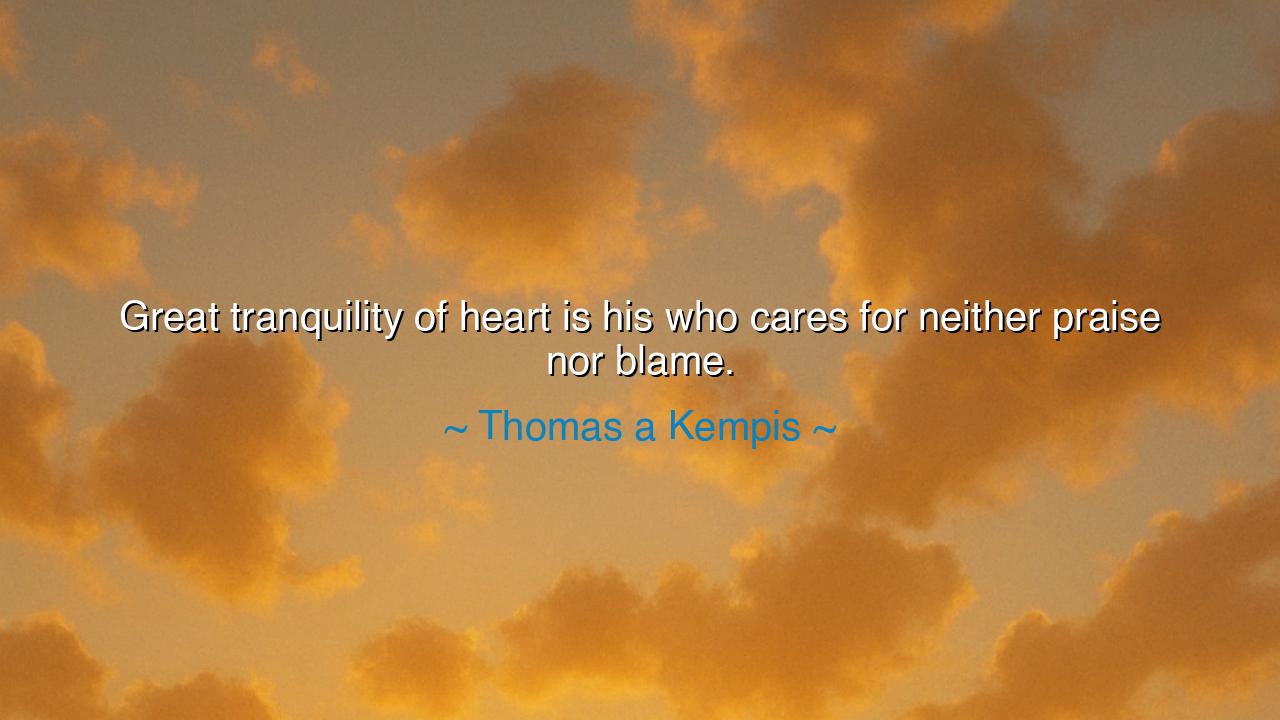
Great tranquility of heart is his who cares for neither praise






“Great tranquility of heart is his who cares for neither praise nor blame.”
Thus wrote Thomas à Kempis, the quiet monk of the fifteenth century, whose masterpiece The Imitation of Christ became one of the most beloved spiritual works of all time. His words, simple yet eternal, reveal the secret path to inner peace — the kind that neither fortune nor failure can disturb. In this single sentence, Kempis speaks of the liberation that comes when a soul is freed from the restless hunger for approval and the torment of criticism. He teaches that true tranquility arises only when one no longer depends on the changing voices of the world, but listens instead to the still voice of truth within.
The origin of this quote lies in a world much like our own, though centuries removed — a world filled with ambition, rivalry, and noise. Even within the cloisters of religious life, men sought recognition for piety or wisdom. Kempis, who spent his life in quiet contemplation, saw how easily the human heart becomes enslaved to the opinions of others. Some live for praise, measuring their worth by the applause of the crowd; others live in fear of blame, bending their souls to avoid judgment. But both, he warns, are prisoners — bound by chains of vanity and fear. Only the one who ceases to care for either can stand free, serene as a mountain unmoved by the winds.
To care neither for praise nor blame is not to become indifferent or cold, but to become centered, rooted in truth. The ancients called this state ataraxia — the calm of a soul untouched by turmoil. The Stoic philosopher Epictetus taught much the same: “If you wish to be free, desire only what depends upon yourself.” For both the Stoic and the Christian mystic, peace comes when one’s joy and worth are no longer hostage to the fleeting judgments of men. The praise of others may lift you high, but it is a fragile throne; their blame may cast you down, but only if you give them the power to wound you.
History offers us many who lived this truth. Consider Socrates, who faced condemnation and death with tranquil courage. When accused unjustly, he neither raged nor despaired, but said simply, “To do wrong is worse than to suffer it.” He cared neither for the praise of the mob nor the blame of his accusers; his peace lay in the knowledge that he had lived rightly. Or think of Mother Teresa, who was praised as a saint by some and vilified by others — yet she continued her work with the poor, undisturbed. Her heart, fixed on love, was beyond the reach of worldly opinion. These souls understood what Kempis meant: that peace belongs not to those who are admired, but to those who are anchored in purpose.
Praise and blame are but two masks of the same illusion — both are mirrors that distort rather than reveal. The world praises when it is pleased and blames when it is not; but truth is not born from their approval. The wise learn to live by conscience, not by applause. They act not to be seen, but because the act itself is just and good. The moment a person begins to measure their worth by others’ opinions, their heart becomes restless, forever tossed between pride and shame. But when one acts from the quiet certainty of the soul — when one’s purpose is guided by faith, integrity, or principle — then tranquility of heart descends like a blessing.
This teaching is both ancient and difficult. To release oneself from the need for praise is to face the ego and say, “You are not my master.” To bear blame without anger is to embrace humility and strength. But the reward is immense: a peace that the world cannot give or take away. In such a heart, storms may rage, yet nothing is disturbed; victories and losses pass by like shadows on water. This is not apathy, but mastery of self — the calm born of knowing that one’s worth lies not in the voices around, but in the quiet truth within.
Let this be the lesson, then: seek not to please, but to be true. Do your work with care, speak your truth with kindness, love with sincerity — and leave the rest to time. Praise will come and go, as will blame, but the peace of a clear conscience endures. Guard your heart from the vanity of approval, and you will walk through the world unshaken.
For as Thomas à Kempis teaches, great tranquility of heart belongs to the one who no longer seeks to be loved by the world, but to live in harmony with truth. When praise no longer intoxicates and blame no longer wounds, then — and only then — the soul becomes free. And in that freedom lies the highest victory a human being can attain: peace that cannot be stolen, for it is rooted in the eternal.






AAdministratorAdministrator
Welcome, honored guests. Please leave a comment, we will respond soon